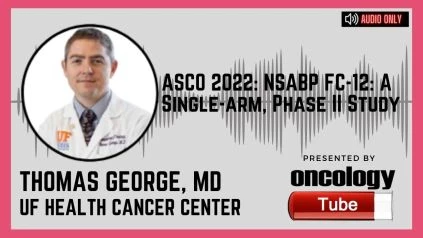Thomas George, MD, FACP, Professor, MD-Hematology/Oncology from UF Health Cancer Center. In this audio, he speaks about the ASCO 2022 Abstract – NSABP FC-12: A single-arm, phase II study to evaluate treatment with gevokizumab in patients with stage II/III colon cancer who remain ctDNA+ after curative surgery and adjuvant chemotherapy.
Origins:
The presence of circulating tumor DNA (ctDNA) in patients (pts) after surgery indicates the presence of minimal/molecular residual disease (MRD) and a near-certain likelihood of disease recurrence. Because the likelihood of recurrence is considerable and therapeutic intervention may provide clinical benefit to patients, therapeutic techniques to treat MRD following standard curative therapy are required. Gevokizumab is a recombinant humanized monoclonal antibody that targets interleukin-1 (IL-1) in all stages of the cancer process (tumorigenesis, invasion, metastasis, angiogenesis, progression, and the modulation of anti-tumor immunity). Gevokizumab has been validated in pre-clinical colon cancer (CC) models, and its safety has been confirmed in late-stage clinical trials. We hope to assess the efficacy of gevokizumab in patients with early-stage CC with MRD (ctDNA positive) after final treatment in our ongoing trial.
Methodology:
NSABP FC-12 is a multi-center, single-arm phase II research that will enroll patients with stage II/III CC who test MRD+ within 6 weeks after completing curative surgery and 3 months of adjuvant chemotherapy. A tailored and tumor-informed ctDNA assay will be used to assess MRD (Signatera bespoke assay). Gevokizumab will be administered intravenously in a single dose of 120 mg every 28 days for 13 cycles. The primary outcome is one-year relapse-free survival (RFS) following the start of trial therapy. Secondary objectives include the rate of ctDNA clearance after 8 weeks of study therapy, as well as gevokizumab’s safety, toxicity, pharmacokinetics, and immunogenicity. Endpoints associated with ctDNA clearance kinetics, tumor mutations, tumor mutational load, circulating methylated DNA, tumor immune microenvironment profile, peripheral blood immunological profile, and stool microbiome analyses will be explored and correlative. The enrollment duration is 12 months. Pts will be monitored for 18 months after enrollment, with ctDNA analysis at predetermined timepoints, until imaging shows recurrence of illness or death. CT scans will be performed every six months. RFS will be calculated in patients who clean ctDNA at 8 weeks against those who do not. A sample size of 31 (alpha=0.151; power 0.811) was used in a single-stage design to test the null hypothesis that the 12-mo RFS is P0.20 vs the alternative (HA) that P0.35. If 9 of 31 patients (29%) are alive and recurrence-free after 12 months, gevokizumab will be judged promising for further research. Enrollment progresses toward the primary goal. 05178576 is the clinical trial number.

